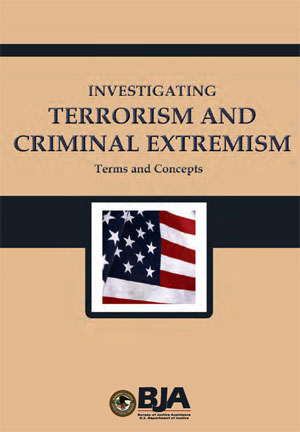Public Intelligence
August 30, 2010
A recent Department of Justice guide for investigators of criminal and extremist groups lists “constitutionalists” and “survivalists” alongside organizations like Al-Qaeda and the Aryan Brotherhood. The 120-page, “Law Enforcement Sensitive” guide to “Investigating Terrorism and Criminal Extremism – Terms and Concepts” describes itself as “a glossary designed primarily as a tool for criminal justice professionals to enhance their understanding of words relating to extremist terminology, phrases, activities, symbols, organizations, and selected names that they may encounter while conducting criminal investigations or prosecutions of members of extremist organizations.”
 | |
Constitutionalist, defined by Random House’s 2010 Dictionary as an “adherent or advocate of constitutionalism or of an existing constitution”, is described in the report as a “generic term for members of the ‘patriot’ movement”. Survivalists are described in the document as fearing a “coming collapse of civilization” and are trying to prepare themselves for this collapse. Such individuals are said to have “typically stockpiled food, water, and weapons, especially the latter, and instructed themselves on topics ranging from first aid to childbirth to edible plants”.
The guide defines the term “New World Order” as being “used by conspiracy theorists to refer to a global conspiracy designed to implement worldwide socialism”. The Bilderberg Group, Trilateral Commission, and Council on Foreign Relations are described as organizations “targeted by right-wing extremists for conspiring to dominate the world”. The guide also defines “One World Government” as the “concept that there will ultimately be a single governing body that will control the world”, adding that “some right-wing extremists fear this occurring, believing that white people will be in the minority, with Jewish people ultimately controlling the world”.
While the document’s introduction does state that “the fact that an entry appears in this publication does not imply a connection to illegal activity”, it goes on to say that the guide consists of “terms that may be germane to members of an extremist movement” or are “singularly employed by specific extremist groups”. The obvious result of the inclusion of terms such as “Bilderberg Group” and “Trilateral Commission” in a report titled “Investigating Terrorism and Criminal Extremism” is that law enforcement officials unaware of these groups will tend to associate legitimate discussion as “extremist” speech. This diminishes the credibility of any person attempting to rationally discuss such groups and fosters a perception that any discussion of such groups could be associated with a supposedly “extremist” ideology.
Examples of “Extremist” Terminology
To see the full list read the U.S. Department of Justice Terrorism and Criminal Extremism Terms 2005-2009.
Black Helicopters: Unmarked dark helicopters allegedly observed by many members of the “patriot” movement, who claim that the helicopters are part of some vast conspiracy, perhaps involving the United Nations or the “New World Order.” Various explanations have been offered for some of the sightings, but the term has since entered the popular vocabulary and is often used as a generic, sometimes satirical reference to conspiracy-related beliefs.
Bilderbergers (Bilderberg Group): Along with the Trilateral Commission and the Council on Foreign Relations, one of the three groups targeted by right-wing extremists for conspiring to dominate the world.
Collection (of Information): The identification, location, and recording/storage of unanalyzed information, typically from an original source and using both human and technological means, for input into the intelligence cycle to determine its usefulness in meeting a defined tactical or strategic intelligence goal.
Concentration Camps: Detention camps supposedly being built or already built by the United States government, according to conspiracy theorists.
Constitutionalists: A generic term for members of the “patriot” movement. It is now often used to refer to members of the sovereign citizen or common law court movement. Sometimes the word “constitutionist” is also used.
Council on Foreign Relations (CFR ): Along with the Bilderbergers and the Trilateral Commission, one of the three key groups that conspiracy theorists claim operate behind the scenes to control the world and to establish the “New World Order.”
Executive Orders: The formal means by which the President of the United States determines the conduct of business in the Executive Branch. Typically, such executive orders take two forms: (1) orders governing administrative or policy matters in Executive Branch agencies or (2) orders for which the authority is derived from congressional authorizations. The “patriot” movement, however, contends that executive orders are “presidential laws” that bypass Congress and subvert the Constitution.
Flag of Peace: The American flag preferred by the “patriot” movement; a red, white, and blue flag without any gold trim, braid, balls, tassels, eagles, fringe, or spear on the flag or pole. Patriots believe that any other American flag is a military flag that denotes military jurisdiction. Only under the “flag of peace” do U.S. citizens receive their constitutional rights and due process.
Globalization: This term generally refers to the denationalization of economies, markets, products, and populations brought about by ever faster travel, improved communications, and advances in technology.
Illuminati: An intellectual society and social club formed by a university professor, Adam Weishaupt (1748–1811), in southern Germany in the 1770s in the spirit of the Enlightenment. It was suppressed by Bavarian authorities in the 1780s. Weishaupt spent the rest of his life writing about the Illuminati. People who believe Illuminati conspiracy theories believe the society never died away but lived on, run by people intent on controlling the world through devious means.
Information Warfare: Synonymous with cyberwarfare, information warfare is the offensive and defensive use of information and information systems to deny, exploit, corrupt, or destroy an adversary’s information, information-based processes, information systems, and computer-based networks while protecting one’s own. Such actions are designed to achieve advantages over military or business adversaries.
Full story HERE
No comments:
Post a Comment